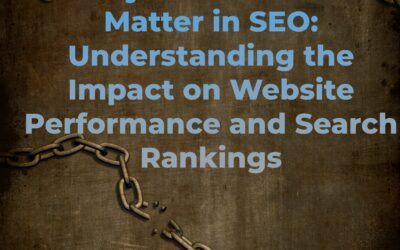Search Engine Optimization (SEO) is a dynamic field that constantly evolves as search engines update their algorithms and user behavior shifts. However, amidst the ever-changing landscape, certain myths and misconceptions about SEO persist, leading to confusion and misinformation among website owners and marketers. In this blog post, we’ll debunk some of the most common SEO myths and shed light on the facts behind effective search engine optimization strategies.
Myth 1: SEO is all about keyword stuffing
Fact:
While keywords are important for SEO, keyword stuffing – the practice of excessively using keywords in content to manipulate search engine rankings – is outdated and can result in penalties from search engines. Instead, focus on creating high-quality, relevant content that naturally incorporates keywords in a meaningful way. Write for your audience first, and optimize for search engines second.
Myth 2: SEO is a one-time task
Fact:
SEO is an ongoing process that requires continuous monitoring, analysis, and optimization. Search engines regularly update their algorithms, and competitor landscape shifts, necessitating constant adjustments to your SEO strategy. Regularly audit your website, monitor performance metrics, and adapt your tactics accordingly to stay ahead in the competitive search landscape.
Myth 3: Backlinks are the only important ranking factor
Fact:
While backlinks are an essential ranking factor, they’re not the only one. Search engines consider numerous factors when determining a website’s ranking, including content quality, user experience, site speed, mobile-friendliness, and more. A holistic approach to SEO that addresses various aspects of website optimization is crucial for long-term success.
Myth 4: More pages equal better rankings
Fact:
Quantity does not always equate to quality in SEO. While having a larger website with more pages can potentially provide more opportunities for ranking, it’s essential to prioritize quality over quantity. Focus on creating valuable, informative content that addresses the needs of your target audience, rather than churning out thin or duplicate content just to increase page count.
Myth 5: SEO is all about ranking #1
Fact:
While achieving a top ranking in search results is desirable, it’s not the sole measure of SEO success. The goal of SEO is to drive relevant organic traffic to your website and ultimately, convert visitors into customers or leads. Focus on attracting quality traffic, improving user engagement, and delivering a positive user experience, rather than obsessing over ranking positions.
Myth 6: SEO results are immediate
Fact:
SEO is a long-term strategy that requires patience and persistence. It takes time for search engines to crawl and index new content, and even longer to see the impact of optimization efforts on rankings. Be prepared to invest time and effort into SEO initiatives, and understand that results may not be immediate but will compound over time with consistent effort.
Myth 7: Meta tags have no impact on SEO
Fact:
While meta tags (such as title tags and meta descriptions) may not directly influence search engine rankings, they play a crucial role in attracting clicks from search engine users. Well-optimized meta tags can improve click-through rates (CTR), which indirectly impacts SEO performance. Write compelling, descriptive meta tags that accurately reflect the content of your pages to entice users to click.
Myth 8: Social Media Signals Directly Impact Rankings
Fact:
While social media shares and engagement can indirectly influence rankings by increasing brand visibility and driving traffic to your website, social media signals themselves are not direct ranking factors in search engine algorithms.
Myth 9: Paid Advertising Helps Organic Rankings
Fact:
Paid advertising (such as Google Ads) does not directly impact organic rankings. While paid ads can increase visibility and traffic, organic rankings are determined by the quality and relevance of your website’s content, among other factors.
Myth 10: Submitting Your Website to Search Engines Boosts Rankings
Fact:
Search engines automatically crawl and index websites, so manual submission is unnecessary for most websites. Focus on creating high-quality content and optimizing your website for search engines instead of relying on manual submission.
Myth 11: Exact Match Domains (EMDs) Boost Rankings
Fact:
Exact match domains, which contain keywords identical to the search query, used to have a significant impact on rankings. However, search engines have become more sophisticated, and EMDs alone are unlikely to boost rankings without quality content and other SEO factors.
Myth 12 : Google Penalizes Duplicate Content Across Domains
Fact:
While duplicate content within the same domain can harm rankings, duplicate content across different domains (such as syndicated articles or product descriptions) typically does not result in penalties. However, it may dilute the visibility of the original content.
Myth 13 : HTTPS is Not Necessary for SEO
Fact:
HTTPS (Hypertext Transfer Protocol Secure) encryption is now a ranking factor in Google’s algorithm. Switching to HTTPS not only improves security but also boosts trust and may positively impact rankings.
Myth 14 : SEO is Dead
Fact:
Despite claims of its demise, SEO is very much alive and essential for online visibility. As long as people use search engines to find information, SEO will remain a crucial strategy for businesses and website owners.
Myth 15 : You Can Trick Search Engines with Black Hat SEO Tactics
Fact:
While black hat SEO tactics (such as keyword stuffing, cloaking, and buying links) may yield short-term gains, they often result in penalties and long-term damage to your website’s reputation and rankings. Focus on ethical, white hat SEO strategies for sustainable results.
Conclusion:
By understanding the truths behind SEO fundamentals and debunking common misconceptions, you can navigate the landscape with confidence and improve your website’s visibility and rankings in search engine results. Remember that SEO is not a one-size-fits-all endeavor; it requires ongoing effort, adaptation, and commitment to delivering valuable, user-friendly experiences that resonate with both users and search engines alike. Stay informed, adapt to algorithm updates, and prioritize user experience and quality content to stay ahead in the ever-changing SEO landscape.
__ __





0 Comments